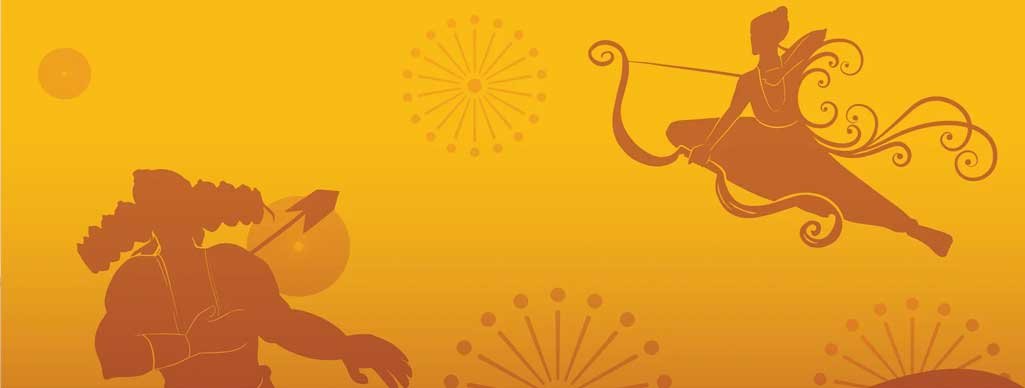

Gunjan Jain, Awadhesh Kumar , IOCL
gunjanj@indianoil.in, awadeshk@indianoil.in

A SCENE FROM RAMAYANA
Finally, it was the time of war. The army of monkeys, bears under the leadership of Bhagwan Ram had crossed the mighty ocean and were at the door-steps of ‘Lanka’. Jamvant, the astute leader then suggested the way ahead and requested Bhagwan Ram to send Angad as a messenger to make a last effort to avert the war. Accordingly, Angad went to the durbar of Ravana and asked Ravana to surrender before Bhagwan Ram. The episode narrated by Goswami Tulsi Das in Ramcharitmanas is narrated as below:

Ravana started to insult Sri Rama and offered Angad to join him stating that his father Vali, was his friend. Angada however rejected Ravana’s advances. Experiencing Ravana’s arrogance, Angad got really angry and put his foot on the floor and challenged that if anyone can lift his foot, he on behalf of Bhagwan Ram commits that his entire army will go back without fighting. All present in the sabha tried but they could not lift the foot of Angad and went back to their seats disappointingly.
At last, when everyone else failed, Ravana himself got up to lift the foot of Angad and when he was about to touch the foot, Angad himself moved his leg and said to Ravana that he should not touch his feet as it will be of no use for him, instead he should go and touch the feet of Bhagwan Ram which will fetch him the forgiveness from Bhagwan Ram. Ravana hearing all this got severely embarrassed and came back to his sinhasan and sat dejected/humiliated/embarrased.
The above episode throws some very important insights into life/management lessons/leadership traits/behaviour. Some we could identify are explained below:
Delegating tasks with a freedom to act – Empowering others: Imagine the level of trust Bhagwan Ram had on Angad and the level of empowerment Angad displayed when he committed to Ravana that if someone could lift his feet, Bhagwan Ram would concede defeat and return without Mata Sita.
Leadership is about empowering others as a result of your presence whenever you’re in front of them and also creating the conditions where people can be empowered even when you’re not there. Joseph Juran (one of the early quality gurus) defined empowerment as “conferring the right to make decisions and take action.”
The most successful leaders infact, are the ones that are totally focused on the success of their team. Lets read a few examples:
J.R.D. worked through empowerment and was a master delegator. He created stalwarts like Sumant Moolgaokar, Russi Mody, Ajit Kerkar and Darbari Seth. He operated through empowering people.
In his comments about empowering employees by helping them find their own solutions, Jagdish Khattar, the former managing director of the automaker Maruti Udyog, echoes a sentiment common among Indian leaders: “Throw issues to them, let them examine and come back to you with solutions. I have done it again and again….85% of their solution would be what you have in mind. Let them go back with the impression that 100% of the solution is theirs. The implementation would be quick and smooth, and they will feel very proud of it, but it serves your purpose.”
2. The mentally tough survive/thrive: There is a famous saying . Indeed, battle is fought in the mind of generals. War for ‘Lanka’ was lost that day only as Ravana lost the battle in mind as he sat dejected on his sinhasan.
So being mentally tough is very important which one can easily relate in the contemporary cricket where before start of the tournament or series respective country’s media, players as well as ex-players resort to break the mental shield of the opposition. “Mental disintegration” was a term made popular by former Australia captain Steve Waugh and his men. Thus, be it life or a professional career, mental toughness, the ability not to accept defeat in mind carries a person far.
Further, during the recent Russia’s Ukrainian Invasion, we have witnessed how Ukranian President Volodymyr Zelensky emerged as a mentally tough and courageous wartime leader, perfectly meeting the nation’s needs for firm leadership. Despite world leaders’ numerous urgings, he has refused to leave Ukraine, both before and after the start of the Russian invasion. He remained in Kyiv, despite anticipated assassination attempts, and has day after day served as a model of resistance to the personal and national existential threat. His act of mental toughness inspired Ukrainians to unite around him and defend Ukraine.
3. Define your limits by being mindful of your enemy’s strength: The narration also throws an interesting episode as to why Angad took his legs back when Ravana approached him to lift his foot. Possibly, inside he knew that Ravana has the might and
force to lift his foot. Thus, he cleverly retreated himself and while retreating turned his possible defeat into a winning proposition.
In 1941, Germany attacked the Soviet Union. Massive and bitter fighting continued and lasted into the winter of 1942-1943. On 19 November 1942, the Soviet Red Army launched a massive attack against the Germans called Operation Uranus. The Germans lacked ammunition, food, fuel and everything else except extreme courage in the face of overwhelming odds. When the Soviets encircled the German 6th Army under the command of Field Marshall von Paulus, he was ordered by German Fuhrer Adolf Hitler to fight and die in place, and no retreat or surrender was authorized. The decision to forbid a retreat led to the loss of 300,000 German and Axis troops killed and captured, losses the Germans could not very well sustain, making the blunder of not allowing a retreat at Stalingrad one of the pivotal points of World War II in Europe.
So, knowing one’s limit and playing on the same is equally important. Remember what Sun Tzu in his famous book The Art of War has quoted
“If you know the enemy and know yourself, you need not fear the result of a hundred battles. If you know yourself but not the enemy, for every victory gained you will also suffer a defeat. If you know neither the enemy nor yourself, you will succumb in every battle.”
REFERENCES
[1]. https://rohitdhir.com/delegation-in-ramayana-mythology-management/
[2]. https://myhbp.org/hmm12/content/leading_people/how_will_you_lead.html#o14
[3]. https://www.wilsoncenter.org/blog-post/zelensky-versus-putin-personality-factor-russias-war-ukraine
Posted in Talent Management | No Comments »
Recent Articles
- Role of Leaders in Team Network Interpersonal Skills
- Unlocking the Tapestry of Learning & Development: a Journey through Time & Networks
- Aarohi – As The Flight Leaves The Land
- 20% Time – Innovation through playfulness
- Workplace Culture of Playfulness: Creating an environment of humour and positivity
- We Aren’t Paying Enough Attention to Humor in the Workplace
- Three quotients to manage talent
- Seriously, What’s so Funny?
- Happy Souls at Work: Playfulness Well-being Productivity
- The Joy of Work: Building a Culture Where Playfulness Meets Performance
- Corporate Learnings from ‘Mogambo’ – The Iconic Villain of Indian Film Mr. India
- Talent Development and Succession Planning for Organizational Sustainability
- An Ideal Workplace – Happy & Fun!
- The role of leadership in encouraging a playful environment
- Injecting Joy into Work: The Benefits of a Playful Office Culture
- Five on Five: Five Leadership Styles for Five Generations ACT & LEAD!
- The CEO’s Dharma: Leadership Lessons from Narada’s Inquiry
- 3-D Leader: BANI and Heart Economy
- The Talent Management Odyssey: A Quest for the Holy Grail of HR
- Generation Z in the Workforce: Challenges and Opportunities
- Talent Management in Post-Independent Indian Governance- A Case Study
- Pareto Principle in the Workplace
- Breaking Good: Sabbatical leave- A comprehensive insight
- Influencing V/S Manipulation
- Prosocial Emotions as Lever for Employee Engagement
- The Table with the lady
- Can Compassion and Executive Presence Co-exist
- Empathetic Organisations are not Built Overnight !
- Employee Excitement
- Women, Leadership and opportunities
- Corporate Diversity & Inclusion
- Connections in the time of Covid
- Developing connect with the missing shift employee
- Becoming the employer of choice in the new normal
- Open Secret to Build a Culture of Sustainability through GHRM (Green Human Resources Management)
- Green HRM: Building a Culture of Sustainability
- Cultural Lens
- Trust Credibility
- Organizational Culture and Covid-19: An employee’s perspective
- Culture: Fostering Values for Unleashing Human Potential
- Psychological safety in a team: Whose responsibility?
- “Dispelling the fear of failure – Nurturing innovation and experimentation”
- Fighting Fear through Growth Mindset & Experimentation
- Situational Leadership: A Brahmastra
- ONGC Succession Planning
- Leadership
- Unleashing the Power of failure and Innovation: A Call to Action for Indians in the 21st Century
- Managing Executive Obsolescence for Career Growth
- Action Learning
- The Best Coach to Rewire people
- The eLearning series: A practitioner’s take
- Learning in the Flow of Work – Lets step up the Game
- E-learning a practitioner’s take- Part 2
- The Forgetting Curve – The best ways of Memorising & Learning
- Leaders as teachers
- The New India – Post Covid
- Learning & Development Gamified
- About Fear, loneliness and Exile at Workplace
- My Journey as a Coach-Leader
- Lessons from Ramayana
- Delivering Happiness through CSR
- Story of positive transformation
- Conquering the fear of failure
- Role of organization culture and values in growth of human potential
- The cost of Failure is…Learning!
- Talent Experience
- CSR Initiatives: The Key Drivers for India’s Sustainable Development Growth
- Gaining Wisdom from the Mahabharata
- Six Thinking Hats – A Decision Making Technique
- Next Normal of Talent Acquisition
- Talent Experience
- Role of Spirituality in effective Human Resource Management
- The ‘next normal’ workplace – A generational perspective
- The Pursuit for Recognition
- How to make Innovation an integral culture of an Organization
- Nuturing Talent – For Organisational Growth
- How Google Sold Its Engineers on Management
- Talent Leadership: Perhaps the new Talent Management
- Words have Power
- The Ultimate Team Game!
- The ‘Feedback Fridays’
- Talent Experience
- Pursuit of Dominance
- How Does Anticipated Emotion from a Decision Outcome Determine Our Ethical Behaviour? A Working Paper
- Talent Management
- From failing to innovating: Role of HR in promoting experimentation
- Unleashing the Power of Talent Management: Lessons from History to Modern Day
- Embracing Evolution: Behavior-Based Hiring and Technological Synergy for Organization’s Future Workforce
- Transforming Workforce Recruitment
- Data-Driven Play: Leveraging Analytics in Gamified Hiring
- Rational Recipe To Recruitment: Future Of Hiring
- Redefining the hiring recipe: Recruiting candidates beyond the resume!
- The Power of Attitude: Why Employers Seek the Right Mindset
- Principles of Recruitment
